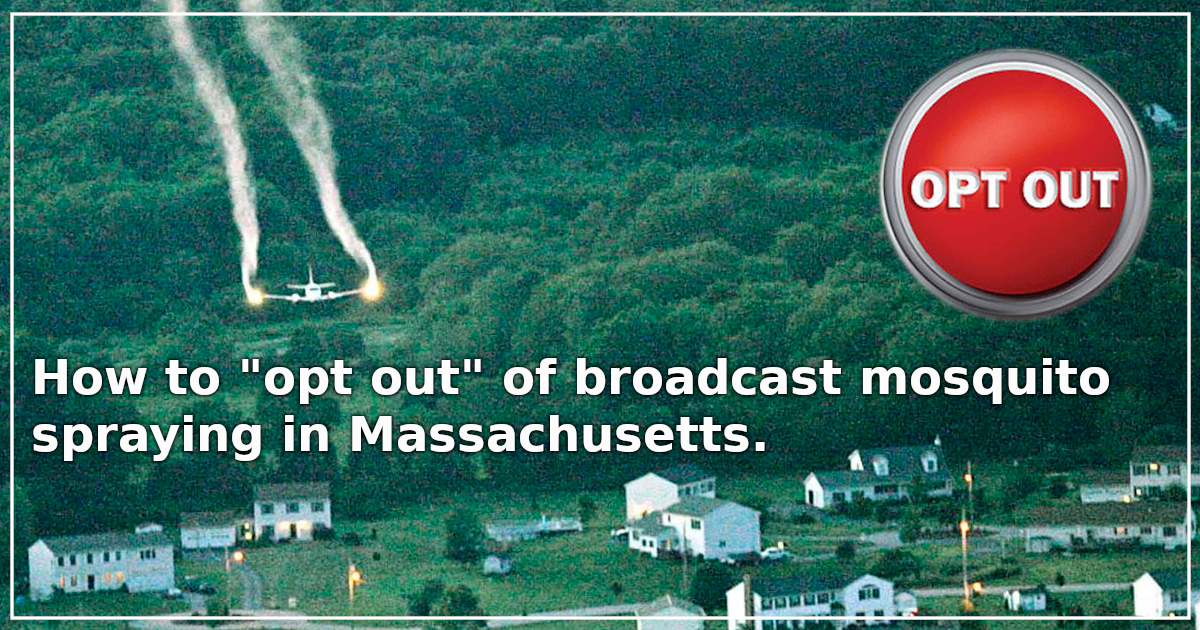by Clint Richmond, Plastics & Toxics Lead & MA Executive Committee Member
It’s August and mosquito season is here. Mosquito populations are currently down somewhat due to the current drought conditions. However, we should all still be mindful of mosquito-borne diseases. Eastern equine encephalitis (EEE) is a rare but serious seasonal virus that can cause severe illness and possibly death in people of all ages, though people under age 15 are particularly at risk. Two human EEE cases in different parts of the state have been found in August of this year. The state conducted its first aerial spraying soon afterward. West Nile Virus (WNV) is another serious mosquito-borne disease that can cause serious illness or death. Currently there are no vaccines to prevent or medications to treat WNV in people, even though it is the leading cause of mosquito-borne disease in the United States.
Common-sense solutions can help mitigate risks of mosquito-borne illness. When going outside, people should cover their skin by wearing long sleeved shirts and pants, and apply insect repellent. The EPA maintains a list of approved insect repellent products that are “proven safe and effective” though some of these repellents contain harmful chemicals. Oil of lemon eucalyptus is a naturally occurring substance containing p-menthane 3,8-diol (PMD), a highly effective and long acting mosquito repellent, which does appear on the EPA list. For your home, using screens in your windows and doors can also help prevent mosquitoes from entering and biting you. Additionally, emptying outdoor containers, such as tires, trash cans, and pots of standing water can help control mosquito populations, which spawn in water.
The typical solution employed by municipal governments to control mosquito-borne diseases is to spray synthetic petrochemical pesticides (Anvil® 10+10, a pyrethroid), even though it is the least effective and most environmentally damaging method. Aerial spraying “only targets flying adults, not the eggs, larva or pupae, meaning that many repeat applications are needed to have any hope of controlling emerging adult mosquitoes” according to PEER Science Policy Director Kyla Bennett. Meanwhile, studies show that the traditional blanket spraying of synthetic pesticides is a threat to the integrity of insect biodiversity (such as bees and other pollinators) and ecosystem health that our farms and gardens rely upon.
The spraying of pesticides also raises serious health concerns, especially during the current COVID-19 pandemic. Anvil 10+10 contains two chemicals: one of which, PBO, is classified as a “possible human carcinogen,” which means that blanket aerial spraying of the pesticide is irresponsible and dangerous for residents of Massachusetts communities where spraying takes place. Petrochemical pesticides are also known to elevate risk factors to our immune and respiratory systems. We know that COVID-19 wreaks havoc on the immune and respiratory systems — people with underlying medical conditions like heart disease, lung disease, or diabetes are more susceptible to complications from COVID-19. Compounding risks from aerial spraying with pre-existing conditions and COVID-19 once again is irresponsible and dangerous for Massachusetts residents.
If you want to reduce your family’s and your local ecosystem’s exposure to these toxins, there is an option to “opt-out” of spraying carried out by the Commonwealth: https://www.mass.gov/how-to/how-to-request-exclusion-from-wide-area-pesticide-applications
However, there are also some important caveats:
- IMPORTANT NOTE: Exclusion requests must be refiled EACH CALENDAR YEAR.
- You can request to be excluded from wide-area applications of pesticides through the Dept. of Agriculture (renters must have the permission of their landlord).
- When you fill out the above form, it goes directly to the mosquito control project that services that town, and that property will be excluded.
- Note also that excluded properties should be marked with signage saying “No Spray” as outlined on the above-linked page.
- HOWEVER … when a public health hazard is declared by the Department of Public Health (which is very likely to happen this year) and emergency spraying takes place. Exclusions are not honored during the emergency spraying set forth in the DPH declaration unless the property is a certified organic farm.
- Whoever fills out the form should be notified if/when a spraying occurs. That way at least people can take some precautions.
Even if you don't expect your property or residence to be sprayed, requesting an exclusion is one way to protest this harmful approach.
If you completed the opt-out request form, let us know about your experience! Email us at chapter@massachusetts.sierraclub.org.
The Sierra Club is working in coalition with several partner organizations including NOFA Mass, who provided some of the material for this article.
